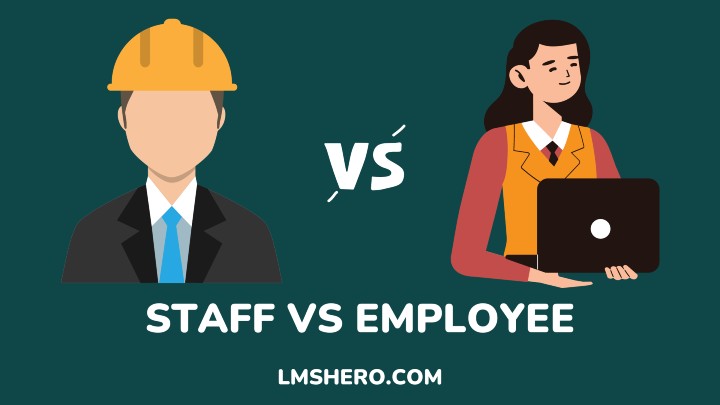Wondering what the difference is between a staff member and an employee? While an employer employs both to perform certain duties, they possess distinct differences that set them apart.
This article outlines staff and employees’ differences, benefits, and roles in a business or organization.
What is a staff?
You can simply define staff as a group of employees or persons tasked with executing a contract or performing the work of an organization.

Staff typically denotes an organization’s workforce. It can also refer to either a particular group or the entire workforce in the organization.
Another definition refers to staff as a group of people hired by a contractor to perform certain duties stipulated in a contract. This can include laborers, suppliers, sub-contractors, and agents.
Who is an employee?
An employee is someone that has been hired by an employer to perform a certain duty or job.
Employees are subject to the will of their employers and must work the way the employer demands to receive payment. Generally, an employee works for a person or organization that pays him or her a wage or salary.
Types of employee/employment
The most common employee types of classification include:
- Full-time employees: A full-time employee is covered by the labor agreement and works a regular forty (40) hour work week for the business.
- Part-time employees: A person who works fewer than a certain amount of hours during a typical work week is a part-time employee. Although most businesses define this as any time spent working fewer than 40 hours per week, the Fair Labor Standards Act currently does not distinguish between part-time and full-time employment.
- Seasonal employees: Seasonal employment is temporary work done to fill a company’s short-term needs at specific times of the year.
- Temporary employees: Temporary employment describes a scenario in which employees are only employed briefly. This can include fixed-term contracts, project or task-based employment, and seasonal or casual work, such as day labor.
- Leased employees: Employee leasing is when a staffing company provides personnel for projects or temporarily enters into an agreement with a company.
What’s the difference between staff members and employees?
Not all workers in a workforce (staff members) receive pay, whereas employees are those who receive pay or salaries from their employer.
Common examples of staff members that may or may not receive pay include interns and volunteers.
Interns, contractors, and volunteers are considered staff; although employees are not required to be employees, they have legal standing.
In contrast to contractors, who are more independent than workers, an employer has control over the work that is completed by an employee and how it is carried out.
Employees are also entitled to some benefits like paid time off, health insurance, and pension that volunteers or contractors don’t have access to.
What are the functions of a staff?
In most businesses, the main function of staff jobs is to support and advise colleagues in line positions. All staff duties are human resources, maintenance, legal, financial, and public relations.
Staff duties can be any supplementary business activity that assists with a company’s core operations. It also has no immediate impact on clients or revenue. This business activity supports the line functions of a business to achieve its objectives.
Can contractors be part-timers?
Yes, contractors can work part-time due to the flexibility of their schedules. Independent contractors can find temporary contract positions in a variety of fields.
These fields include graphic design, web development, business consulting, health and safety, writing, and editing.
The normal duration of independent contractor employment is usually specified. This might vary depending on the project’s specifications and the demands of the hiring organization or agency.
You need expertise and preferably experience in a related sector to land a part-time gig as an independent contractor. History in the industry in which you are seeking employment is frequently one of the minimal requirements.
Writing, childcare, cosmetology, carpentry, construction, and media industries, among others, all frequently employ independent contractors.
Organizations may require a bachelor’s degree, certification, or knowledge of a particular application for a flexible part-time position.
FAQs
What employee benefits are important?
Vacation time, health insurance, retirement plans, and flexible hours. However, employers provide many of these benefits only to full-time employees.
What employee benefits are not taxable?
Tax-free benefits include health insurance, retirement, and de minimis, which cost less than a certain amount. Other non-taxable benefits include on-premises meals, disability insurance, health insurance, and educational assistance.
What are the benefits of being a contractor?
The benefits of being a contractor include more freedom to choose your work hours (although you will not always get holiday pay) and greater freedom to change occupations. You also have the chance to expand your network and your contact list.
Conclusion
These above definitions should help you understand the differences between staff and employees. While they each have their merits, understanding them can help you make the best choice for your business.
While employers can secure the services of staffers and employees, staff jobs have more independence and flexibility.
However, unlike most full-time employment with perks and benefits like vacation or health insurance, not all staff jobs may offer these benefits.
In fact, being a staff member does not necessarily mean you receive payment from the organization you work for.
A classic example would be volunteers who put in work at a business. While they are considered staff members of that business, they are not considered employees.
I hope you found this article helpful. You can also learn more about volunteering and how it differs from being a paid employee.
Thanks for reading.






